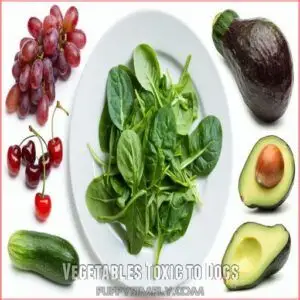This site is supported by our readers. We may earn a commission, at no cost to you, if you purchase through links.
 You can safely feed your dog fresh spinach in moderation.
You can safely feed your dog fresh spinach in moderation.
This nutrient-rich leafy green packs iron, vitamins A and K, and antioxidants that support your pup’s immune system and vision.
However, you’ll need to be mindful of portion sizes – too much spinach can interfere with calcium absorption and potentially cause kidney issues due to its oxalate content.
For most healthy dogs, 1-3 small leaves mixed into their regular food is perfect.
Just like Popeye gained strength from spinach, your furry friend can benefit too – but there’s more to know about preparing it safely and maximizing its benefits.
Table Of Contents
- Key Takeaways
- Benefits of Fresh Spinach for Dogs
- Can Dogs Safely Eat Fresh Spinach
- Preparing Fresh Spinach for Dogs
- Spinach and Canine Health Conditions
- Other Safe Fruits and Vegetables for Dogs
- Vegetables Toxic to Dogs
- Consulting Your Vet Before Feeding Spinach
- Frequently Asked Questions (FAQs)
- Can dogs eat cooked spinach?
- How does one eat spinach?
- What happens if a dog eats too much spinach?
- Can dogs eat spinach if they have kidney problems?
- Can dogs eat spinach if he is hypothyroid?
- Can dogs eat fruits & vegetables?
- Can my dog eat raw spinach?
- How much spinach to give a dog?
- What vegetables are not good for dogs?
- Can dogs eat eggs and spinach?
- How much fresh spinach can my dog eat daily?
- Does organic spinach make a difference for dogs?
- Can puppies safely eat fresh spinach leaves?
- When should I stop giving spinach to dogs?
- Are frozen and fresh spinach equally safe for dogs?
- Conclusion
Key Takeaways
- You can safely feed your dog fresh spinach in moderation – 1-3 small leaves mixed into their regular food is ideal for most healthy dogs.
- You’ll need to steam the spinach first since raw spinach is harder to digest – avoid seasonings and wash thoroughly to remove pesticides and contaminants.
- Don’t give your dog spinach if they have kidney problems or hypothyroidism since the oxalic acid can interfere with calcium absorption and affect thyroid function.
- You’ll get the most benefits by mixing steamed spinach into your dog’s food 1-2 times per week, as it provides iron, vitamins A and K, and antioxidants that support immune health.
Benefits of Fresh Spinach for Dogs
You’ll boost your dog’s health with fresh spinach’s rich blend of protein, iron, and essential vitamins.
Your pup can enjoy this low-calorie treat that provides antioxidants and fiber while helping them stay hydrated.
Nutritional Value and Composition
Understanding spinach’s nutritional profile helps you make informed decisions about feeding it to your dog.
This leafy green powerhouse is packed with essential nutrients that can complement your pup’s diet.
- High in protein (2.9g per 100g) and fiber for healthy digestion
- Rich source of iron, calcium, and potassium
- Contains vitamins A, B, C, and K in significant amounts
These nutrients work together to support your dog’s overall health when served in moderation.
Health Benefits of Fresh Spinach
Fresh spinach packs a powerful punch for your pup’s health.
It’s loaded with antioxidants that fight free radicals and support immune function.
The iron content helps maintain healthy blood cells, while protein aids muscle growth and repair.
Your dog’s eyes and coat will thank you too – spinach’s vitamin A and beta-carotene promote sharp vision and a glossy coat.
Plus, it’s naturally low in calories and fat.
Can Fresh Spinach Support Healthy Digestion
Spinach packs a powerful punch for your dog’s digestive system, thanks to its rich fiber content. When served properly, this leafy green can help maintain gut health and promote regular bowel movements. Additionally, spinach is a nutrient-rich snack that provides essential vitamins A, B, C, and K, iron, and antioxidants, making it a healthy addition to a balanced diet for dogs learn more about spinach benefits.
Here’s how spinach supports your pup’s digestion:
- The natural fiber acts as a prebiotic, feeding beneficial gut bacteria
- Its roughage helps move food through the digestive tract
- The fiber content can help regulate stool consistency
How Fresh Spinach Helps With Hydration
With its impressive 91% water content, fresh spinach offers a natural way to boost your dog’s hydration levels.
You’ll find this leafy green particularly helpful during hot summer days or after intense exercise sessions.
Beyond just water, spinach delivers essential nutrients that support your pup’s overall hydration balance.
It’s nature’s way of keeping your four-legged friend properly hydrated while sneaking in some extra vitamins and minerals.
Can Dogs Safely Eat Fresh Spinach
You can feed your dog fresh spinach safely in moderation, though you’ll need to be mindful of proper preparation and serving size.
Spinach offers valuable nutrients like protein and iron.
However, its oxalic acid content means you should serve it as an occasional treat rather than a daily staple.
Potential Risks and Side Effects
While a leafy green powerhouse, spinach comes with potential health concerns you’ll want to know about. The oxalic acid in spinach can interfere with your dog’s calcium absorption, potentially leading to serious issues.
- Heavy spinach consumption may cause kidney damage due to oxalic acid buildup
- Large portions can trigger sudden metabolic imbalances from low blood calcium
- Excess intake might result in muscle weakness and irregular heart rhythms
Precautions for Feeding Fresh Spinach
Before introducing spinach to your dog’s diet, you’ll need to take several important precautions to make sure their safety, especially since excessive consumption can lead to iron toxicity and kidney problems as spinach health risks.
Consider these essential factors when feeding your pup this leafy green:
| Factor | Risk Level | Precaution |
|---|---|---|
| Oxalic Acid | High | Monitor portion size |
| Pesticides | Medium | Wash thoroughly |
| Digestive Sensitivity | Medium | Start gradually |
| Existing Health Issues | High | Consult vet first |
Remember, your dog’s tolerance for spinach may vary based on their age, size, and overall health condition.
Safe Serving Sizes and Preparation Methods
Keep your dog’s spinach portions small and manageable – about 1-2 tablespoons per 20 pounds of body weight, served once or twice weekly.
You can find more information about the best spinach serving amount for your dog on this website.
Steam the leaves until tender, then chop them into bite-sized pieces.
For storage, keep steamed spinach in an airtight container in the fridge for up to three days.
If you’re unsure about portions, start with a smaller amount and watch how your pup responds.
Preparing Fresh Spinach for Dogs
To maximize the health benefits of spinach for your dog, you should be aware that it contains oxalic acid, which can interfere with calcium absorption, as seen in the risks of spinach for dogs. You’ll need to prepare your dog’s spinach carefully to maximize its health benefits while avoiding potential risks.
Before you serve this nutritious green to your pup, you need to understand the proper washing, cooking, and serving methods that will keep your four-legged friend safe and healthy.
Steaming Vs. Boiling Vs. Raw Spinach
Steaming fresh spinach preserves essential nutrients your dog needs, making it the top choice for preparation.
Raw spinach can be tough for your pup to digest, potentially causing stomach upset.
While boiling might seem convenient, it actually strips away valuable vitamins and minerals.
For the best results, steam spinach for 3-5 minutes until tender but still bright green – your dog’s body will thank you.
Removing Pesticides and Contaminants
Your dog’s safety starts with proper spinach cleaning.
Rinse leaves thoroughly under cold running water to remove dirt, bacteria, and pesticide residues.
For extra protection, soak spinach in a mixture of water and white vinegar (3:1 ratio) for 5 minutes.
While organic spinach typically contains fewer pesticides, it still needs washing to remove potential bacteria and dirt.
Pat the leaves dry with paper towels.
Chopping and Serving Fresh Spinach
After thoroughly washing your spinach, chop it into small, bite-sized pieces – about the size of a dime.
This makes it easier for your pup to chew and digest.
Store any unused portions in an airtight container in the fridge for up to three days.
When serving, start with just a tablespoon for small dogs or two tablespoons for larger breeds, mixing it into their regular food.
Avoiding Harmful Additives and Seasonings
Plain spinach keeps your pup safe and healthy, but additives can turn this nutritious treat into a hazard.
When preparing spinach for your dog, follow these essential guidelines:
- Skip salt, garlic, and onions – these common seasonings can be toxic to dogs
- Avoid dressings and preservatives that might upset their stomach
- Keep it simple with just steamed spinach – your dog will enjoy the natural taste
Spinach and Canine Health Conditions
If you’re managing your dog’s health conditions, you’ll want to know how spinach affects their kidney function and thyroid health.
While spinach offers nutritional benefits, its oxalic acid content and natural compounds can impact certain medical conditions, so you should definitely understand these interactions before adding it to your dog’s diet.
Spinach and Kidney Problems
The high oxalate content in spinach can affect your dog’s kidney health, particularly if they’re prone to kidney stones.
While occasional servings won’t harm healthy dogs, those with existing kidney issues should steer clear.
Think of oxalates like tiny troublemakers that can bind to calcium, potentially forming kidney stones over time.
It’s smart to check with your vet about serving sizes that work for your pup’s specific situation.
Spinach and Hypothyroidism
If your dog has hypothyroidism, you’ll want to watch their spinach intake carefully.
While spinach is packed with nutrients, it contains goitrogens that could affect thyroid function when eaten in large amounts.
Don’t worry too much though – moderate amounts won’t cause problems. Just stick to small portions (about 1-2 tablespoons for medium-sized dogs) and always check with your vet about the right serving size.
Spinach and Other Health Conditions
Beyond thyroid concerns, your dog’s overall health plays a key role in determining if spinach is right for them.
Watch for signs of spinach allergies, which can include itching or stomach upset.
Dogs with kidney stones should limit spinach due to its oxalate content.
Those with calcium deficiency may need to avoid it since oxalic acid can interfere with calcium absorption.
Always monitor for digestive problems.
Other Safe Fruits and Vegetables for Dogs
You’ll be happy to know that your dog can safely enjoy many fruits and vegetables besides spinach, including fiber-rich apples, potassium-packed bananas, and vitamin-loaded carrots.
While these healthy treats can supplement your pup’s regular diet, remember to remove seeds, pits, and rinds before serving them to your furry friend.
Fruits Like Apples and Bananas
Looking to treat your pup with healthy fruits? Apples make excellent low-calorie snacks when you remove the seeds and core, offering vitamins A and C plus fiber.
Bananas pack a powerful punch of potassium, biotin, and copper – perfect for an occasional reward.
Blueberries are tiny powerhouses of antioxidants, while cantaloupe provides hydration and essential nutrients.
Just remember to serve these fruits in moderation as treats, not meals.
Vegetables Like Carrots and Green Beans
Choosing safe options like Chihuahua safe veggies is crucial to avoid unhealthy ingredients. Choosing the right veggie treats can transform your dog’s snack time into a healthy adventure.
Here’s why carrots and green beans deserve a spot in your pup’s treat rotation:
- Carrots pack a punch with beta-carotene and fiber, making them perfect low-calorie chews
- Green beans offer essential vitamins and minerals without excess calories
- Both vegetables help clean your dog’s teeth naturally
- These crunchy treats can be served raw or lightly steamed
Leafy Greens Like Kale and Lettuce
While carrots and green beans offer excellent nutrition, other leafy options need careful consideration.
Kale, despite its superfood status for humans, contains compounds that might lead to kidney stones in dogs.
For a safer alternative, consider products that highlight spinach dog benefits Spinach for Dogs.
Lettuce requires thorough washing due to contamination risks from E. coli and listeria.
When choosing leafy greens for your pup, remember that moderation is key, and always wash them carefully before serving.
Vegetables Toxic to Dogs
While you’re learning about fresh spinach for your furry friend, it’s important to know which vegetables can harm your dog’s health.
You’ll want to steer clear of common vegetables like avocados, cherries, grapes, and onions, as they contain compounds that can cause serious health problems ranging from kidney failure to blood cell damage.
Avocado and Persin
You’ve mastered giving your dog healthy fruits, but let’s talk about one fruit that’s off-limits: avocados.
They contain persin, a fungicidal toxin found in the fruit’s pit, skin, and leaves.
If your dog eats avocado, they might experience vomiting, diarrhea, or breathing difficulties.
The highest concentration of persin is in the pit and skin, so keep those guacamole ingredients far from your furry friend’s reach.
Cherries and Cyanide
Those innocent-looking cherries in your fruit bowl can spell serious trouble for your furry friend.
The pits, stems, and leaves of cherries contain cyanide, a dangerous compound that’s toxic to dogs.
Here’s what every pet parent should know:
- Cherry flesh is less toxic but still risky
- Cherry pits can cause intestinal blockages
- Early symptoms include dilated pupils, difficulty breathing, and bright red gums
Never let your pup near fallen cherries in the yard.
Grapes and Kidney Failure
Grapes and raisins pack a dangerous punch for your furry friend – even a small amount can trigger sudden kidney failure.
Grapes are toxic to dogs, and there’s no safe way to serve them.
Keep all forms of grapes away from your pup, including grape juice and baked goods containing raisins.
If your dog eats grapes, contact your vet immediately.
Onions and Red Blood Cell Damage
While grapes attack the kidneys, onions launch a different kind of assault on your dog’s body.
These common kitchen staples, including all forms like leeks and chives, contain compounds that trigger the destruction of red blood cells in dogs.
Even small amounts as low as 0.5% of a dog’s body weight causing life-threatening anemia, as seen in cases of onion toxicity risks.
Even small amounts can lead to anemia, causing weakness and lethargy.
Never feed your pup onions, whether they’re raw, cooked, powdered, or hidden in other foods.
Consulting Your Vet Before Feeding Spinach
You’ll want to check with your veterinarian before adding spinach to your dog’s diet, especially if your pup has existing health conditions like kidney problems or hypothyroidism.
Your vet can help you determine the right serving size and frequency based on your dog’s age, weight, and overall health status.
Ensuring a Balanced Diet
Now that you know which foods to avoid, let’s focus on creating a well-rounded menu for your pup.
Before adding spinach to your dog’s diet, consult your vet to develop a balanced nutrition plan, and consider exploring online resources such as Dog food spinach products.
Here are three key considerations:
- Calculate proper portions based on your dog’s size and activity level
- Mix different approved vegetables for varied nutrients
- Keep treats to 10% of daily caloric intake
Monitoring Your Dog’s Health
Keep tabs on your dog’s health when adding spinach to their menu. Watch for these key signs that signal how well they’re handling their leafy greens:
| Signs to Monitor | What to Do |
|---|---|
| Upset stomach | Skip spinach for a few days |
| Normal digestion | Continue current amount |
| Excessive gas | Reduce portion size |
Always log any changes in your pup’s behavior, appetite, or bathroom habits, and share these observations with your vet during check-ups.
Adjusting Spinach Serving Sizes and Frequency
Since every dog’s nutritional needs differ based on size, age, and health status, you’ll need to adjust spinach portions accordingly.
Small breeds should start with a teaspoon of cooked spinach, while larger dogs can handle up to two tablespoons.
Watch for any digestive changes and adjust serving sizes based on your pup’s response.
Consider your dog’s individual needs and check with your vet for personalized guidance.
Frequently Asked Questions (FAQs)
Can dogs eat cooked spinach?
Yes, your dog can safely eat cooked spinach, which is rich in nutrients like vitamins A, B, C, and K, and can be a healthy addition to their diet in moderation, see spinach for dogs safety. Yes, your dog can safely eat cooked spinach!
Steam it plain without seasonings or oils for the best nutrition.
You’ll want to serve it in moderation since too much can affect calcium absorption in their body.
How does one eat spinach?
You can enjoy spinach raw in fresh salads or sauté it with garlic and olive oil.
Steam or stir-fry for a quick side dish, blend it into smoothies, or add it to pasta dishes.
What happens if a dog eats too much spinach?
Like a ticking time bomb, excessive spinach can disrupt your dog’s calcium levels.
Potentially causing kidney damage, muscle weakness, and abnormal heart rhythms.
Don’t let those leafy greens become a health hazard.
Can dogs eat spinach if they have kidney problems?
Dogs with kidney problems should avoid spinach entirely.
Spinach has a high oxalic acid content.
This could strain already compromised kidneys and interfere with calcium absorption.
Consult your vet for kidney-friendly vegetable alternatives instead.
Can dogs eat spinach if he is hypothyroid?
Steamed spinach should be limited if your pup has hypothyroidism, as it contains goitrogens that may interfere with thyroid function.
Consult your vet before adding it to their diet, as individual cases vary.
Can dogs eat fruits & vegetables?
Yes, adding certain vegetables like bok choy as a nutritious and beneficial addition can enhance your dog’s diet, and your dog can safely enjoy many fruits and vegetables as healthy treats.
Safe options include apples, carrots, and blueberries.
Avoid toxic ones like grapes and onions.
Can my dog eat raw spinach?
While you might be tempted to toss your pup some raw spinach, it’s better to steam it first.
Steaming preserves the nutrients.
Raw spinach is harder to digest and could cause tummy troubles.
How much spinach to give a dog?
Offer your dog small amounts of steamed spinach: 1-3 tablespoons for large breeds and 1/2-1 tablespoon for small breeds.
Serve it as an occasional treat, limiting to once or twice per week.
What vegetables are not good for dogs?
Keep your dog away from onions, garlic, wild mushrooms, avocados, grapes, raisins, cherries, and tomato plants.
These common vegetables and fruits can be toxic, causing serious health issues or kidney failure.
Can dogs eat eggs and spinach?
Yes, your dog can safely eat some vegetables, like green beans, which are a nutritional powerhouse for dogs. Yes, your dog can safely eat eggs and spinach together.
Eggs provide protein and essential nutrients, while steamed spinach offers vitamins and iron.
Just serve them plain, without seasonings, and in moderate portions.
How much fresh spinach can my dog eat daily?
While 90% of dogs enjoy leafy greens, limit fresh spinach to 1-2 small leaves per 20 pounds of body weight daily.
If you’re serving it steamed, that’s about 1-3 tablespoons for medium-sized dogs.
Does organic spinach make a difference for dogs?
Organic spinach offers your dog the same nutritional benefits as conventional spinach but with fewer pesticide residues.
You’ll still need to wash it thoroughly and serve it steamed for best safety and digestibility.
Can puppies safely eat fresh spinach leaves?
Even the tiniest pups need extra care with their greens.
It’s best to wait until your puppy is at least 12 weeks old before introducing small amounts of cooked spinach, always consulting your vet first.
When should I stop giving spinach to dogs?
Stop giving spinach to your dog if you notice digestive issues, changes in urination, or weakness.
Limit servings to prevent kidney problems from oxalic acid buildup.
Watch for signs of calcium deficiency like muscle tremors.
Are frozen and fresh spinach equally safe for dogs?
Both frozen and fresh spinach are safe for your dog when prepared correctly.
You’ll want to steam either type and avoid seasonings.
Frozen spinach can be more convenient but may have slightly fewer nutrients.
Conclusion
When considering adding new foods to their dog’s diet, pet owners often explore alternative options like a raw dog food diet, benefits of raw food which can offer species-appropriate nutrition. Studies show 67% of pet owners worry about adding new foods to their dog’s diet.
Now you know that fresh spinach isn’t just safe – it’s a nutritious addition to your pup’s meals when served properly.
Remember to start with small portions, wash thoroughly, and watch for any digestive changes.
While you can feed your dog fresh spinach regularly, moderation is key.
Always check with your vet, especially if your dog has existing health conditions, before making dietary changes.


















